November 25, 2016
Historical precedents inform us that national party conventions are supposed to ratify a platform and select a nominee, affirm party identity, and celebrate collective unity.[i] This occurs through a four-day spectacle of sight and sound that builds to the climax, the nominee’s acceptance speech at the end of the last day. Not totally unlike the experience of Wagner’s four-day Ring der Nibelungen performance, the musico-dramatic spectacle of the convention should uplift and overwhelm the participants, when it functions according to plan and tradition. Music is mobilized in this context to help create and reinforce a certain spirit among delegates, to foster unity on the convention floor, and to fill in gaps in the stage action.
However, custom-dictated purposes and practices can be derailed by natural disasters like hurricanes (Gustav in 2008 and Isaac in 2012, the latter causing the Republican National Convention to abbreviate its proceedings), or like the tectonic party rifts that opened the Republican and Democratic national conventions this year. Whether the split between Sanders adherents and Hillary Clinton, or the self-distancing of the Republican leadership from a possible Trump nomination, the respective party conventions were wild affairs that reflected more disunity and uncivility than the spectacle of harmony and discipline that tradition dictated. Vocal signs of delegate disapproval flourished on the first day of the respective conventions. In such a welter of anger, music’s voice in underscoring spectacle was diminished until later in the weeks, when the expected display of harmony was at the fore. Still, the first day of the DNC did bring an opportunity for music to redeem a difficult situation: Paul Simon took the stage and performed solo his (and Art Garfunkel’s) song “Bridge Over Troubled Water” to reconcile the Bernie supporters to the idea of a Clinton nomination (Fig. 1). After all, Simon and Garfunkel had given permission for the Sanders camp to use their song “America” in a campaign ad. Although the gesture may not have stilled the derisive chorus of Bernie supporters—Simon himself was in poor voice—,the symbolism of music bridging the gap between Clinton and Sanders was not lost on all delegates, and then Sanders spoke and tried to heal the division within the party by endorsing Hillary Clinton.
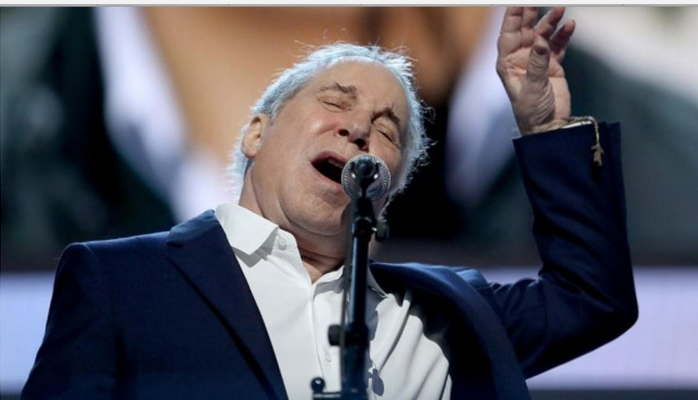
In general, the music at the two conventions followed predictable paths: the Republicans relied upon their allegiances with rock and country, while the Democrats tended towards pop sounds.[iii] As their house band the RNC brought back G.E. Smith and associates, who had provided most of the tracks at the 2012 convention (Fig. 2). The guitarist-band leader justified taking up the offer with the following words: “Not only will this pay for several years of Josie’s school but I can hire six or seven of my friends, and give them a really good pay day too… I’ve been a professional musician since I was 11 years old. It’s what I do: work.”[iv] Smith’s band certainly was more than competent in its musical execution, but they tended to homogenize whatever music they played, so there was not much distinction between David Bowie’s “Station to Station” and Neil Diamond’s “Sweet Caroline,” for example. In contrast, the Democrats had a full roster of guest appearances by noted artists, as they did in 2012 (but with a decided shift towards the pop side: Boyz II Men, Demi Lovato, Carole King, Lenny Kravitz, Paul Simon, Alicia Keys, and Katy Perry, among others). It was an all-star line-up that rivaled Obama’s in celebrity; the primary difference with four years earlier was in the music to accompany stage action, to fill in gaps, and to motivate delegates: while Obama gave the musical direction over to a DJ, DJ Cassidy, who laid down pre-recorded tracks for walk-ons and walk-offs and the like, Clinton had a band director lead the live performances that accompanied such onstage actions. The Democratic house band was led by Rickey Minor, a former musical director on The Tonight Show with Jay Leno – he not only directed but also produced the music at the DNC (Fig. 3). This espousal of a live performance house-band aesthetic over the work of a DJ marks one of the ways that the Clinton team musically distanced themselves from the Obama legacy, in what might be considered something of a retreat from the edgier musical profile established by the sitting President.
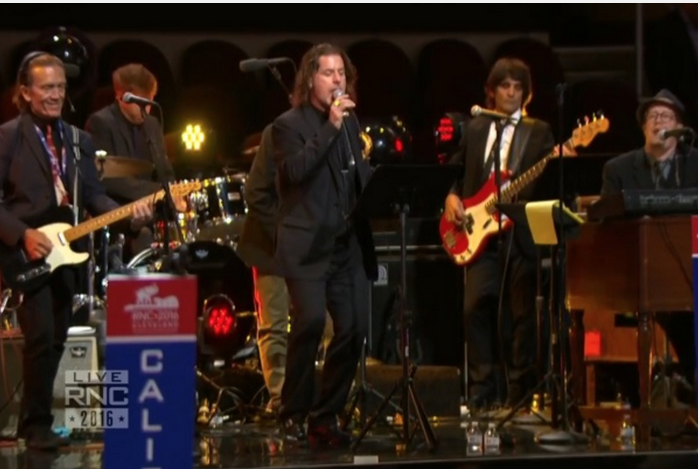
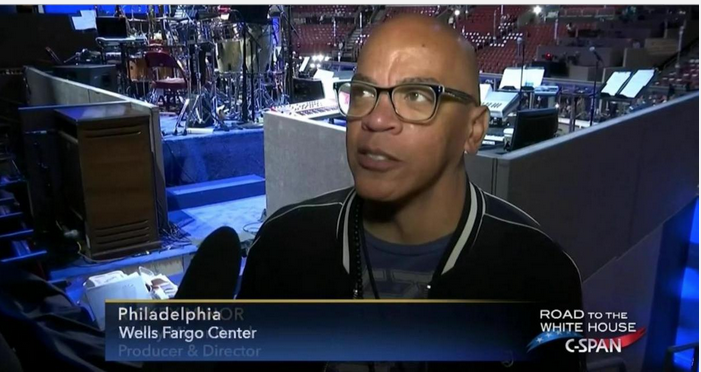
In fact, if we were to compare the playlists from the convention halls in Cleveland (Quicken Loans Arena) and Philadelphia (Wells Fargo Center), we might have to recognize the Republicans for their eclectic mix (despite Smith’s smoothing out of rough edges in performance). Yes, GOP stalwarts Kid Rock and Lynyrd Skynard did perform in Cleveland, but only off-site, at invitation-only concerts offered ostensibly for the benefit of veterans. The shift in the soundtrack of the RNC was not lost on the reporting media. Writing for NPR, Tsioulcas observed that “Smith and his fellow musicians put together some intriguing song choices to entertain the delegates.”[vii] Indeed, on the same playlist as “Sweet Caroline” you would find David Bowie’s cocaine-referencing “Station to Station” and the Rolling Stones’ classic song about love, politics, and drugs “You Can’t Always Get What You Want.” Commenters throughout the Internet were quick to point out the apparent disconnect between the disillusionment of the Stones lyrics and the song’s placement after Trump’s acceptance speech, supposedly the climax in the convention’s spectacle of unity. As an explanation for the music’s repeated performance at his rally, Trump simply remarked, “I like Mick Jagger. I like their songs.”[viii] With such a justification and logic for inclusion, it would be hard for a campaign manager to devise a consistent musical strategy for the convention that based itself upon traditional criterion of unity of style and message. Trump’s disruption of conventional wisdom in running a campaign clearly extended to music at the party’s convention as well. Other songs at the RNC that did not conform to the conservative, white, “heartland” image of the typical Republican included The Clash’s “Rock the Casbah,” REO Speedwagon’s “Roll with the Changes,” AC/DC’s “You Shook Me All Night Long,” Faces’ “Stay with Me,” and even “Born in the USA” by outspoken Republican opponent Bruce Springsteen. The fact that these songs were all performed by the Smith band re-defines the concept of liveness, for they were all live but not realized by their creators; in essence it turned G.E. Smith and associates into cover artists, a point seemingly overlooked by the press, including musical news outlets. The limiting of musical performance to one group of agents had several results: first of all, it eliminated the possibility of unwanted political demonstrations on the part of the performers; secondly, delegates would be kept unaware of the relative paucity of live musical offerings onstage; and finally, the reliance on covers played by one band ensured a uniformity of musical performance, and at an acceptable level of expression.
The reasons for the anomalies of the RNC playlist are unclear, but besides having a candidate with unorthodox tastes, we should keep in mind that the convention took place in Cleveland, home of the Rock & Roll Hall of Fame (an electric guitar was featured on the convention logo). Whether or not he was responsible for the musical selections, Smith’s reprise of his role as band leader for the RNC had more than a tinge of irony: G.E. Smith was born George Edward Haddad, the son of Lebanese immigrants—his last name translates from the Arabic to “blacksmith,” or “smith” for short. Under a Trump presidency, his parents may well not have been admitted to the United States.
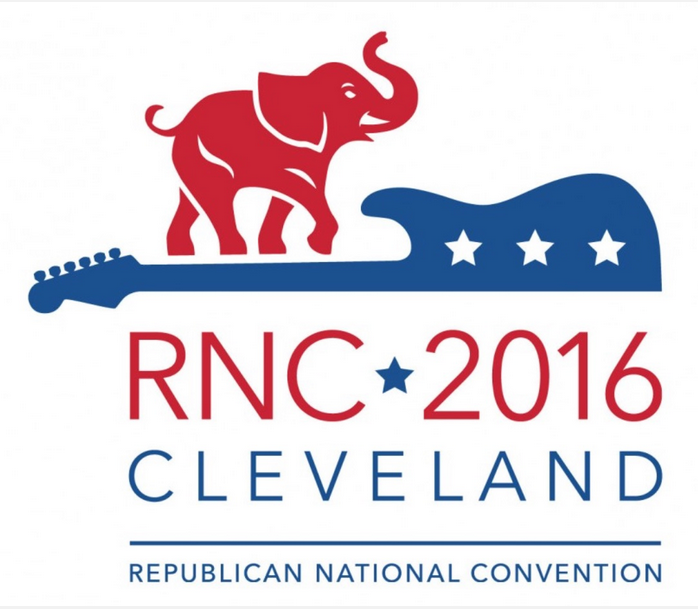
For their part, the Democrats could count on the active support of musicians, who as a lot tend to support liberal causes and candidates. Like in the past, the DNC foregrounded the diversity of its supporters, and thus representation of artists and groups from the Democratic voter bases of African-Americans, Latinos, and college-educated whites was quite apparent on the stage and undoubtedly drove their selection of musical acts. This contributed to the broad spread of live performances, from the troupe of Broadway musical cast members to the solitary Paul Simon, from Jessica Sanchez performing a song written for the occasion to Carole King rendering her classic “You’ve Got a Friend.” The convention stage was understandably by and large given over to female artists, especially the fourth night: Star Swain, Carole King, Sheila E., and Katy Perry. Most of the artists let their music speak for them, but Demi Lovato delivered an impassioned speech on mental illness on the first night of the DNC (Fig. 5).
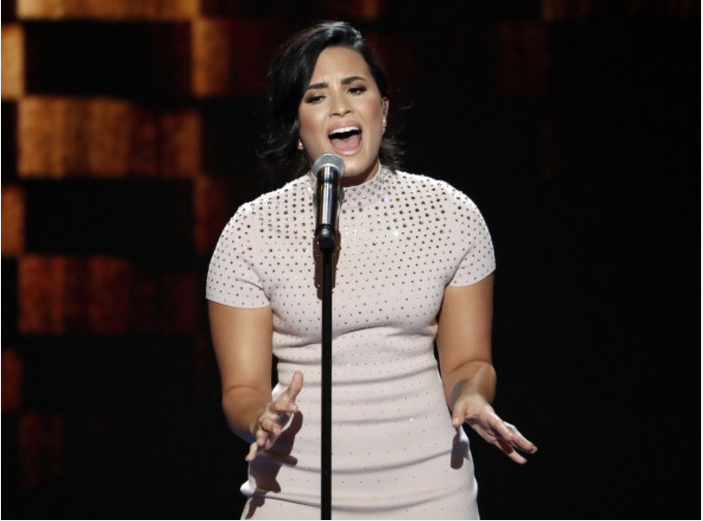
As already mentioned, Rickey Minor led and produced the music at the DNC. He was interviewed by C-SPAN regarding his responsibilities, which provides some interesting insights into how the house bands function. Minor’s band (which has been together since 1999) rehearsed for two days in LA prior to the convention, bringing a repertory of 300 songs to Philadelphia. He remarked that some presenters suggest songs they would like to have represent them for the walk-ons, but since they perform all-instrumental music for speakers, titles matter less than the energy of the song. When asked about what to do during booing, as happened at the beginning of the DNC, Minor said, “that’s easy. Play louder. I have power. I can turn it up to twelve.”[xi] However, booing has been an exception at the party conventions, although in the current climate of uncivility or—seen otherwise—speaking your mind, it may become a permanent feature of conventions. Ted Cruz received a chorus of boos after his RNC speech, when he refused to endorse Trump. And I may add, booing also contributes to the musical soundscape of a party convention, much as cheering and other spontaneous audience sounds of affirmation do.
One musical phenomenon associated with conventions that is growing in popularity is the off-site concert, whether as a benefit for veterans or the city of Camden, New Jersey, or as a means to offer an alternative entertainment to what is happening on the convention floor of the other party. For example, the American country group The Band Perry was heard not in Quicken Loans Arena, but rather at the Jacobs Pavilion after the proceedings closed on Monday, 18 July, the concert intending to “honor” the House Republican Leadership, the House Republican Conference, the Wisconsin Delegates, and national state-level Republican leadership. The next night, Super 18 Diamond (a Neil Diamond tribute band) and Rick Springfield furnished the music for an event at the same time and in the same place, ”to honor the House Republican whip team.”[xii] It was at such an event (and not in the convention hall) that GOP VIPs got to hear conservative favorites Kid Rock and Lynyrd Skynyrd, But the Democrats were not beyond providing elite musical entertainments of their own: by one estimate they offered 170 off-site activities for guests, albeit often to benefit specific charitable causes and recognize the work of party members.[xiii] Thus, on Thursday, 28 July, Lady Gaga, Lenny Kravitz, and DJ Jazzy Jeff wrapped up the convention with a free concert at the BB&T Pavilion in Camden, New Jersey, under the event title “Camden Rising.” Elsewhere in Philly you could take in convention- or party-themed performances by Ke$ha, Drive-By Truckers, Alicia Keys, and Haim, just to name a few of the pro-Democratic (or anti-Trump) musicians. One of the causes underscored by a special off-site concert was Gabby Giffords’ pro-gun control super PAC, Americans for Responsible Solutions, which hosted Ke$ha, Drive-By Truckers, and DJ Reach on Tuesday, at 10 p.m.
For 2012, major performances still took place within the frame of the conventions, where all of the delegates could benefit from a brush with celebrity. The proliferation of musical events outside the convention halls in 2016 should cause the researcher (and the delegate) to reconsider what exactly constitutes the DNC and RNC. This redefining is especially needed in light of the media’s collapsing of all convention-related events in a given host city under the umbrella rubrics of “Democratic National Convention” and “Republican National Convention.” If the traditional in-hall convention experience were to spill out into the surrounding community, as increasingly appears to be the case, it might also be necessary to redefine the spectacle that has characterized the national party conventions from the start.
–
James Deaville
[i] For a discussion of the history and aesthetics of the national party conventions, with special emphasis on those of 2012, see this author’s “The Sound of Media Spectacle: Music at the Party Conventions,” Music and Politics 9, no. 2 (2015), at: http://quod.lib.umich.edu/m/mp/9460447.0009.205?view=text;rgn=main.
[ii] Image: https://cbsradionews.files.wordpress.com/2016/07/paul-simon-getty-dnc.jpg?w=640&h=360&crop=1.
[iii] The candidate Barack Obama and the Democratic party drew upon classic R & B/soul for the 2008 convention and the same with a healthy dose of classic rock in 2012, while for Hillary Clinton’s nomination, the predominant sound was (female) pop.
[iv] Anastasia Tsioulcas, “Cleveland, Rocked: Music at The Republican National Convention,” NPR Music, July 22, 2016, http://www.npr.org/sections/therecord/2016/07/22/487022287/cleveland-rocked-music-at-the-republican-national-convention.
[v] Image: http://static01.mediaite.com/med/wp-content/uploads/2016/07/1thumb-11.jpg.
[vi] Image: https://images.c-span.org/Files/b80/20160728190850002_hd.jpg/Thumbs/height.630.no_border.width.1200.jpg.
[vii] Ibid.
[viii] Ibid.
[ix] Image: http://image.cleveland.com/home/cleve-media/width960/img/plain-dealer/photo/2015/11/23/rnc-logo-revise-2ca-0bb7962a053130ed.jpg.
[x] Image: https://nyppagesix.files.wordpress.com/2016/07/dem-2016-convention_exch-3.jpg?quality=90&strip=all&w=664&h=441&crop=1.
[xi] “Democratic National Convention House Band Leader,” C-SPAN, July 27, 2016, https://www.c-span.org/video/?413281-1/democratic-national-convention-house-band-leader.
[xii] “Music Stars Lining Up to Perform at Charity Concert Events at RNC in Cleveland,” Webster Public Relations, July 8, 2016, http://websterpr.com/news/music-stars-lining-perform-charity-concert-events-during-rnc-convention-cleveland.
[xiii] Peter Weber, “The Democratic National Convention Will Have Some Serious Star Power,” The Week, July 14, 2016, http://theweek.com/speedreads/635921/democratic-national-convention-have-some-serious-star-power.
